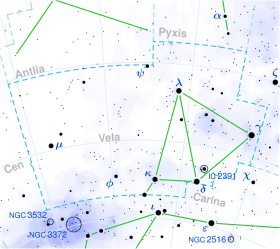Top Qs
Timeline
Chat
Perspective
HD 74180
Supergiant star in the constellation Vela From Wikipedia, the free encyclopedia
Remove ads
HD 74180 is a single[13] star in the constellation Vela. It is a yellow-white F-type supergiant with a mean apparent magnitude of +3.81 and a spectral classification F8Ib. Estimates of its distance to Earth vary between 3,200 and 8,300 light-years.
Remove ads
Properties

b Velorum has been classified as a suspected α Cygni variable star which varies by only 0.06 magnitude. There are possible periods near 53, 80, and 160 days, but the variation is largely irregular.[5] It lies less than a degree from the small open cluster NGC 2645, but is not a member.[4]
Several studies have considered b Velorum to be a highly luminous supergiant or hypergiant with an early F spectral type, for example F2 Ia+,[5] F0 Ia,[6] and F4 I.[14] There were corresponding luminosity estimates of several hundred thousand L☉. A 2015 study used the Barbier-Chalonge-Divan (BCD) system to derive a luminosity of 34,000 L☉ and a cooler less luminous F8 Ib spectral type.[4]
Remove ads
Distance and size
Multiple papers give different distances for b Velorum. Bailer-Jones et al. (2021) give a distance of about 2,530 pc (8,300 ly).[10] The Hipparcos spacecraft give a parallax of 0.67±0.16 mas, translating into a distance of 1,492.5 pc (4,868 ly).[2] Aidelman et al. (2015) give a distance of 990 pc (3,200 ly).[4] At the Hipparcos distance, b Velorum has its apparent brightness diminished by 1.11 magnitudes due to interstellar extinction.[12]
b Velorum has an angular diameter estimated at 1.824 mas.[15] The physical size depends on the star's distance, and could be 190 R☉ assuming the distance of Aidelman et al., 290 R☉ assuming the Hipparcos distance, or even 500 R☉ assuming the Bailer-Jones et al. distance.[16]
Remove ads
In chinese astronomy
In Chinese, 天社 (Tiān Shè), meaning Celestial Earth God's Temple, refers to an asterism consisting of Kappa Velorum, Gamma2 Velorum, b Velorum and Delta Velorum.[17] Consequently, Kappa Velorum itself is known as 天社五 (Tiān Shè wǔ), "the Fifth Star of Celestial Earth God's Temple".[18]
Notes
- Applying the Stefan–Boltzmann law with a nominal solar effective temperature of 5,772 K:
Remove ads
References
Wikiwand - on
Seamless Wikipedia browsing. On steroids.
Remove ads


